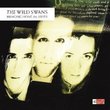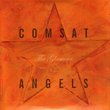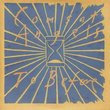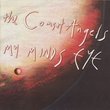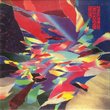| All Artists: Comsat Angels Title: BBC Sessions 1979-1984 Members Wishing: 4 Total Copies: 0 Label: Renascent UK Original Release Date: 1/1/2006 Re-Release Date: 4/17/2006 Album Type: Import Genres: Alternative Rock, International Music, Pop, Rock Styles: Hardcore & Punk, New Wave & Post-Punk, Europe, Britain & Ireland Number of Discs: 1 SwapaCD Credits: 1 UPC: 601791801229 |
Search - Comsat Angels :: BBC Sessions 1979-1984
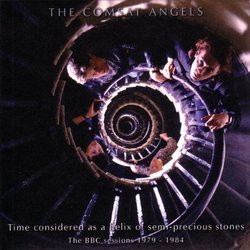 | Comsat Angels BBC Sessions 1979-1984 Genres: Alternative Rock, International Music, Pop, Rock
|
Larger Image |
CD DetailsSimilar CDs
|
CD ReviewsReconsidering latter day Comsats... Eric Hamen | Hilliard, OH United States | 05/17/2006 (5 out of 5 stars) "Renascent UK has done a great job with these BBC sessions. I'm a long time fan of the first 3 Comsat Angels albums (Waiting For a Miracle, Sleep No More and Fiction) and was totally turned off by "Seven Day Vacation" and "Land". Although they later redeemed themselves (especially "My Minds Eye"), I've never liked the 2 Island albums. Hearing the rawer BBC sessions of some of the songs on those albums has helped change my mind a bit. "Land" and "Seven Day Vacation" are still the least of the catalog, but I can hear how much better they would have been with less glossy production. If you've never heard the Comsats before start with "Waiting For a Miracle" to warm up then get the more difficult but absolutely brilliant "Sleep No More". If you're like me, at that point you'll have to have everything... P.S. Renascent UK has released all 3 early albums also. While you're at it, look over the info on The Sound, who have also been reissued. (had to explain to irritated spouse how the increased sound quality and extras on the remasters justified repurchase...)" Doesn't replace the first three albums, but the performances Angry Mofo | 09/23/2007 (4 out of 5 stars) "This lengthily-titled album is a compilation of various radio sessions undertaken by the Comsat Angels during the eighties. It contains songs from their first five albums, but emphasizes the first three, when the band was at the vanguard of the post-punk and goth styles. These albums were moderately successful, but after that the Comsat Angels tried to reinvent themselves as a synth-pop band. They failed commercially and lost most of the ground they had gained. Their albums quickly went out of print and stayed that way. Even Renascent's exhaustive reissues of the Comsat Angels discography skip over this period in the band's career. So, as of this writing, this compilation is the only easily available way to hear some of the songs from those failed synth-pop years. Given how much those albums have been criticized, it's a surprise to find that those songs aren't all bad. They're not the band's best work, and it's easy to see why they didn't have the same appeal as the first three albums -- the lyrics move from the intimate introspection of Waiting For A Miracle and the moodiness of Sleep No More to goofy stuff about sailing ships and ghosts in haunted houses. The drama is very forced and artificial. There is an audience for this kind of thing, though. Some recent synth-pop bands, like Iris, do exactly the same thing, to a greater degree of success. Maybe the Comsat Angels just did it at the wrong time. Some of the songs from this time period, like "Mr. Memory," have Stephen Fellows straining and yelping in stereotypical rock-god style. This is disappointing, because he had just shown some impressive range on Fiction, and he was always better with dramatic restraint and understatement than extroverted emoting. But "High Tide" has a very warm and relaxed vocal performance, and "You Move Me" has a great keyboard hook and a catchy chorus. The instrumentation in both songs is buoyant and melodious, and they leave a sunny impression. There's also a cover of the Rolling Stones' "Citadel," which likewise sounds cheerful and optimistic. It's the only cover ever recorded by the band. But of course, the first three albums are the main event. These radio performances follow the studio versions very closely. The Comsat Angels didn't do much improvisation. Nonetheless, some songs show subtle differences. For example, the version of "Eye Of The Lens" on this album has much more prominent bass than the studio version. The song actually has a great bass line, but the studio version buries it beneath the lead guitar and the drums, so it's only here that one can really appreciate it. The drums are generally less powerful than in the studio recordings, but the band makes up for it by going at a slightly higher tempo. The five selections from the Waiting For A Miracle era are perfectly chosen. These are exactly the band's five best songs from that time -- the two singles "Independence Day" and "Total War," two strong album tracks "Real Story" and "Waiting For A Miracle," and best of all, an obscure B-side called "Ju Ju Money," later remade into an album track on Fiction. The version here has the original arrangement, though, and it actually improves on the studio version by somehow sounding even more sparse and ominous, while adding a lovely fluttering keyboard line. It fits perfectly into the stop-start bass line and the ringing, pensive guitar notes at the end. It might just be the band's best rendition of this song. Interestingly, "Independence Day," the band's most successful single and one of their best songs, ends up being one of the weakest-sounding tracks here. The band can't replicate the ethereal timbre of the main guitar line from the studio version, so they settle for a more conventional jangly sound. And the decreased emphasis on the drums means that the conclusion of the song isn't as rousing as in the studio version. It's still a passable take on the song, but it's not a highlight. Unfortunately, the compilation doesn't quite cut it as an unofficial greatest-hits, because it has only one song from Fiction. "Now I Know" is one of the best songs from that album, and the performance here is very good, although the vaguely Celtic guitar strumming of the studio version gets replaced by a more "standard" electric guitar sound. But "After The Rain" and "Do The Empty House," the two stellar singles from the Fiction era, are sadly absent. Instead, the compilation places the most weight on Sleep No More. Most of the picks are very good. The guitar in "Eye Dance" is less aggressive than in the studio version, but Fellows' delivery of the portentous chorus has the same doomy atmosphere as in the original. The performance of "Eye Of The Lens" is likewise good enough to rival the studio version, and fan favourite "Dark Parade" is as cold and oppressive as ever. But "Sleep No More," the beautiful keyboard-driven slow song, is not included. Instead we get some of the vaguely-worded goth-style album tracks like "Gone" and "Be Brave." All this means that Time Considered As A Helix Of Semi-Precious Stones doesn't quite suffice as a one-stop overview of the Comsat Angels' music. If you want an introduction to the band, either Fiction or Waiting For A Miracle (both reissued by Renascent) would be better choices. But the performances on this compilation are consistently very good, so it is a solid, enjoyable listen. It offers a glimpse of the overlooked synth-pop albums, which is probably just enough, and again, the radio versions of a few songs like "Ju Ju Money" and "Eye Of The Lens" may even add to one's appreciation of the band." 19 Tunes That Should Be On Your iPod Now L. Mitchell | Brooklyn, NY, USA | 10/06/2006 (5 out of 5 stars) "The Comsat Angels are a great forgotten band of the 80s, "Time Considered" being a collection of some of their finest songs, recorded as BBC sessions. If you've never heard their music, this is the perfect place to start. Some of the songs here even outshine the studio album versions, in particular Waiting For A Miracle, Real Story, Eye Of The Lens and the 3 songs from "Land": Island Heart, Mr. Memory and Nature Trails. This was a band with no pretensions--none of the superficial flashiness of many others back then. Guitarist/vocalist Stephen Fellows is a great talent who has been overlooked far too long, as are the other Comsats. Renascent has done a terrific job with this re-release, which includes a booklet giving background and critique of some of the key tracks. So congratulations on having found your way to this page. Now you need to click on that little button up in the corner. The one that says "Add to shopping cart." You won't regret it."
|

 Track Listings (19) - Disc #1
Track Listings (19) - Disc #1